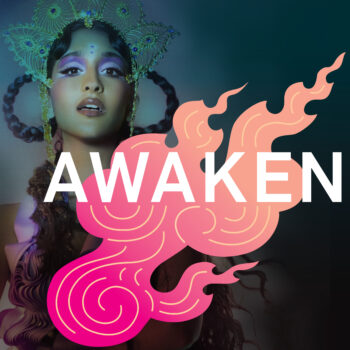
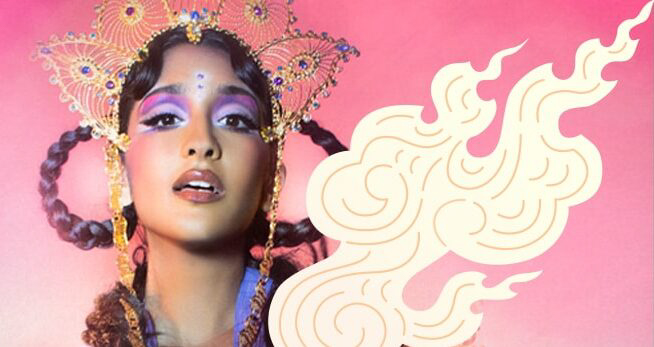
While we often don’t think of ignorance as a feeling, its antidote, awareness, resides at the heart of the mandala. It may be the mind state most difficult to explain, yet it may be the most important, and more complex than meets the eye. If ignorance is used the right way, it can move us from a closed mind to an open one. Is awareness the key to awakening?
RUTH OZEKI:
I was sitting at a coffee shop, and next door to the coffee shop was this kind of a biker bar. It was mid-day, and these two people came out of the biker bar.
RAVEENA AURORA:
Author and Zen priest Ruth Ozeki.
RUTH OZEKI:
And they walked across the street to the motorcycle. It was a man and a woman, the man had a long, long beard, sort of grizzled, gray beard, and a really large beer belly, and a leather vest and chaps. And you know, the woman was dressed in very tight pants, and a very low-cut blouse. I could tell by the way the motorcycle was rigged out that it had straight pipes on it. It was one of these very, very loud motorcycles that I just really can’t stand. [Laughs] And I just had an immediate sense of like, “Oh, I know who these people are, and I don’t like them.” This kind of instinctive aversion just popped up. And I was holding my friend’s dog. My friend had gone into the coffee shop to get the coffee, so I had her dog on a leash.
And the dog is cute. So the woman turned around, and she just exclaimed, “Oh, what a cute little dog.” And then, she and the guy both came over, and they started petting the dog, and we just started chatting about various things, and we had the nicest conversation. Just really, really nice conversation. And then, they left, and they got on their motorcycle, and turned it on, and oh my god, sure enough, it was a motorcycle that made an enormous amount of noise as they sped off down the street. But it was one of those moments where I just thought”“I could see my aversion and my ignorance. It just popped up so quickly the minute I laid eyes on them, but then it also just vanished the minute that we made a connection. And those things, I think, happen all the time.
RAVEENA AURORA:
Welcome to AWAKEN, a podcast from the Rubin Museum of Art that uses art to explore the dynamic path to enlightenment and what it means to “wake up.” I’m singer and songwriter Raveena Aurora and I’ve been learning about the transformative power of art throughout my life.
Since time immemorial, art has been used as a portal to better understand ourselves and the world around us. At the Rubin, a museum dedicated to art from the Himalayas, we believe art can inspire us on a path to awakening. And in this series, we’re using a specific artwork, the mandala, to explore this journey and the emotions that accompany us on the way.
But what is a mandala? A mandala is a guide. People from many cultures and religious traditions around the world use mandalas as maps to navigate their inner lives, including their emotions. Throughout this series, with the guidance of scientists, Buddhist teachers, writers, artists, and activists, we wrestle with five challenging emotions””anger, pride, attachment, envy, and ignorance””to help us take a new perspective on how emotions can influence our day-to-day experiences”¦and what they might be able to teach us if we get curious.
In this episode, ignorance.
Ignorance may be the mind state most difficult to explain yet it may be the most important and as with all of our emotions, it’s more complex than meets the eye.
DZOGCHEN PONLOP RINPOCHE:
Ignorance, in Tibetan, it’s really nice. “AvidyÄ” in Sanskrit, and in Tibetan, “ma rigpa” which literally means “unawareness.”
RAVEENA AURORA:
So while we often don’t think of ignorance as a feeling, it resides at the heart of the mandala, a reminder of where we want to arrive, or return to, the awakened state of curiosity and, as Rinpoche says:
The wisdom of all encompassing space.
Not surprisingly, the antidote to ignorance is awareness, an essential skill gained that is associated with mindfulness meditation practices that helps folks “wake up.”
DZOGCHEN PONLOP RINPOCHE:
Ignorance! What is ignorance? Mm””I’m not clear about it. Yes, I’m just kidding, sorry. What is ignorance?
RUTH OZEKI:
Ignorance in a Buddhist context is one of the three poisons, the three unwholesome root states of mind, along with attachment and aversion, greed and hatred.
SHARON SALZBERG:
Ignorance is ignorance.
RAVEENA AURORA:
That’s Buddhist teacher and author, Sharon Salzberg.
SHARON SALZBERG:
If you insist that human behavior has nothing to do with climate change, you’re going to keep acting in ways that are going to produce more climate change. Or if you insist that there’s a way to conquer death, or it’s not going to happen to you, then you’re going to live in a way that maybe causes a lot of harm. Or you’re going to really believe there’s a way to never be afraid again if you only accumulate enough. These are all wrong ideas. [laughs]
DZOGCHEN PONLOP RINPOCHE:
We all experience this sense of unawareness in the sense that we don’t see a deeper reality. In the sense that we don’t see the reality beyond the capacity or the dimension of our perceptions and our faculties. That’s why””we even have a saying, “Seeing is believing,” but if you think about it, our eye faculty is quite low-tech.
And so we are limiting ourselves in terms of seeing the reality, and we are limiting ourselves to the two-dimensional world or three-dimensional world.
SHARON SALZBERG:
It’s like the feeling when you’re driving along a road and you suddenly think, “Did I already make that turn? What road am I on?”
RAVEENA AURORA:
Psychologist Tracy Dennis-Tiwary is a professor of psychology and neuroscience and the director of the emotions regulation lab at Hunter College, CUNY.
TRACY DENNIS-TIWARY:
Psychology has almost nothing to say about ignorance, which is fascinating in its own way. What we psychologists are very good at are what scientists are good at, which is to deconstruct big aspects of being human into these tractable, studyable parts. And so ignorance is, I don’t think we even like to use that word because it suggests that someone is unable to learn or has failed to learn in such a way that does damage to them, and maybe even can’t be repaired.
RUTH OZEKI:
They certainly happen in Buddhist retreats a lot. People are always telling stories about how they develop a kind of ignorant aversion to the way somebody breathes. [laughs] The person meditating next to them breathes too loudly, and in that ignorance, the aversion arises. And then, as soon as the meditation retreat is over, and people start to talk to each other and make connection, then it’s like, “Oh, wow, really like this person.” So I think that we see those kinds of emotions rising and falling all the time.
SHARON SALZBERG:
Somebody made me a cup. That’s what people have been doing for me in the pandemic. When I say something a lot, like it’s one of my things, they send me a cup with it on it. It says something like, “It never helps to just bang your head against the wall.” So that’s what ignorance does, is we just bang our head against the wall, insisting something that is untrue be true.
TRACY DENNIS-TIWARY:
I like to go back to Erich Fromm in some ways. A post-Freudian, sort of early humanistic psychologist. He really defined what the characteristics of a sane society are relative to us as individuals. And so a sane society is one in which we can love and be loved, be creative, and to believe that we are the author or the agent of our own life in some important ways that we have a sense of autonomy. I would say that ignorance is really the result of losing those capacities in a given society or point in time.
RAVEENA AURORA:
One way of looking at ignorance is an act, a willingness to be ignorant, to avert, avoid, or not want to know. Ruth Ozeki is an author, filmmaker and Zen priest. She is also a professor of writing at Smith College and she thinks a lot about how language, and emotions, are crafted, how they are used and expressed.
RUTH OZEKI:
When you think of it as a verb, of course, it’s to ignore. Ignorance is Latin for literally not knowing. But when we ignore something, it gets a little bit more complicated because there’s volition involved. And so, this idea of ignorance as a willful social construct is something that I find very interesting. And there’s even a field of study that tries to understand this phenomenon””agnotology. Agnotology, you could think of it as the opposite of epistemology.
It’s the study of not knowing. It’s the study of the deliberate, and willful, and culturally produced ignorance. this idea of ignorance as a volitional act, something we do by choice, that we create ignorance by ignoring something. Even if we know better, we choose to ignore. And I think that’s why we’re in such a pickle now.
ADRIENNE MAREE BROWN:
I feel like the spiritual teachers I’ve had in my life have sort of helped me see that those places when I am actually in ignorance is often the places where I can get to feeling the most pride.
RAVEENA AURORA:
adrienne maree brown is an author, activist, organizer, and doula. She has written several books including Pleasure Activism. Her work is founded in principles around collaboration, love and curiosity. She believes that coming from a place of not knowing makes for great potential.
ADRIENNE MAREE BROWN:
That sort of temporary, “I know what I’m doing. I’ve figured this out. I’ve got the move.” And I have one teacher in particular who’s an Aikido teacher, for whom that would be the moment when he would sort of turn you around, flip you up, make it so you could really feel like, “Oh, really? You don’t know how to do this.” [Laugh]
And just put you back in your place of, like, “There’s more to learn. Even if you have figured something out, there’s more to learn.”
And for those folks who stay in ignorance, there’s a rejection of that more to learn. One of the things we’re seeing right now that’s really interesting is what I think of as willful ignorance, like, self-protective, willful, prideful ignorance. And it’s because if you’ve been given a story in which you get to be superior, even though you haven’t done anything to earn that superiority, there’s no backing for it, if you’ve been given that as a story, and it’s actually all you’ve been given, you’ve been stripped of culture, you’ve been stripped of songs, you’ve been stripped of prayers, you’ve been stripped of role in the community that feels clear, you’ve been left with a story where you have to compete to constantly be better than others, and you’re at the top of some amorphous, invisible pile, then I think you think, “Well, I’ll stay in this ignorance.” [Laugh]
RAVEENA AURORA:
But like all the emotional states explored through the mandala, there’s the antidote, the wisdom. And ignorance may have the greatest wisdom of all””awareness, an awareness that sees everything, all the nuances, contradictions and complications. Again, Ruth Ozeki.
RUTH OZEKI:
In these discussions of ignorance and uncertainty, I always think about the poet Keats and his idea of negative capability. It’s sort of a beautiful concept. He described it as the ability of being in uncertainties, mysteries, and doubts without any irritable reaching after fact and reason. And this idea of being in uncertainties, mysteries, and doubts, to him, this is the mark of a great poet. Shakespeare had this ability, so for Keats, this was really what defined a truly great poet.
Being in uncertainties, mysteries, and doubts without any irritable reaching after fact and reason. And I think that’s, like, so beautiful because that sense of irritable reaching after, you can really feel that, what that feels like.
And that, I guess, is a form of ignorance, it’s a delusion. And certainly, I think back to my dad’s death. We all know that people die. We learn that pretty young. But we don’t really know it until we’ve been through and sort of been with someone who is dying, and we are up close and witness this transition. There are different kinds of knowing, and there are different kinds of ignorance.
And I think death is something that, in this culture, we ignore. So, that’s its own kind of ignorance. We’re in ignorance because we ignore it. Whereas the wonderful thing about Buddhism, and I would also say the wonderful thing about novels, is that novel-writing, and novel-reading, and Buddhist practice orient you towards these kinds of truths, even if they’re painful. And so, rather than ignoring them, you orient yourself towards this phenomenon that causes suffering, and you sort of explore it in that way. It’s an antidote to ignorance, I think, in that sense.
RAVEENA AURORA:
Curiosity. Exploration. These are antidotes to ignorance and, as Ruth points out, art offers an opportunity, a potential to explore and engage with challenging things, and see them as they are. That engagement is awareness.
DZOGCHEN PONLOP RINPOCHE:
That wisdom has many different aspects, and one of the key elements of this wisdom is the sense of awareness, awareness that is seeing the reality of the way things are and seeing the reality of the way things manifest. The enlightened aspect of this energy is called the wisdom of all-encompassing space.
RUTH OZEKI:
“In a beginner’s mind, the possibilities are endless. In an expert’s mind, they’re few.” That certainly is pointing to the kind of spaciousness of this condition of not knowing.
DZOGCHEN PONLOP RINPOCHE:
That is the space of what we call dharmadhatu or dharmata, the space of reality or space of śūnyatÄ.
It is the most ultimate, most foundational””the basic space, the basic ground, the ground for everything to emerge from, the ground from which everything arises. Like the great Indian master Nagarjuna said, that because it is emptiness, everything is possible.
So, emptiness is the ground from which everything arises.
RUTH OZEKI:
In Zen, there’s this famous koan, a story, that goes something like this. The monk, Fayan, went on a pilgrimage with some other monks, when a sudden snow storm forced them to take refuge at a monastery. Another monk, Guichen, is the abbot of this monastery.
And so, then, Fayan and Guichen have a conversation, and Guichen asks Fayan, “Where are you going?” and Fayan replies, “Around on a pilgrimage.” And then, Guichen asks, “What is the purpose of a pilgrimage?” And Fayan says, “I don’t know.” And Guichen responds, “Not knowing is most intimate.” in this beautiful little room, in the middle of this conversation, there’s such a sense of intimacy, and there’s such a sense of being able to confess not knowing, and to be reassured. The more I think about that story, the more beautiful I think it is. Because intimacy is”“you have to kind of ask, “Well, what is intimacy? What are the causes and conditions that give rise to intimacy?” Intimacy happens when we let our guard down, when we’re vulnerable, and we’re exposed, and we’re receptive.
When we’re curious about things. And that’s what a pilgrimage is. It’s a journey that you take because you’re curious. It’s an inquiry. And that is, I think, really where the intimacy comes from. It comes from this suspension of knowing, an openness to answers or to more questions, this kind of openness to the world.
DZOGCHEN PONLOP RINPOCHE:
This sense of, a baby””you know, it’s like we talk about that also in the Buddhist teachings, that wisdom, the pure wisdom, is actually innocent awareness. It is inquisitive awareness. It is full of joy to explore.
And so, it’s like the inquisitive mind of a child. When you have a child you can see””I can see in my daughter that when they’re young and growing and they’re full of enthusiasm, full of inquisitive mind, full of exploring mind, and there seem to be no limits, and no [laughs] no limit in their energy, and no limit in their interest of things, that anything is very interesting, even something that is””so not interesting for us [laughs], for grownups. But that actually shows that how we limit ourselves from exploring things. And so when we think we know something and we stop there, that is actually blocking us from further seeing things.
RUTH OZEKI:
That’s the thing about ignorance. In that condition of ignorance, we start making up stories. We start making up stories, and excuses, and explanations, and we start making assumptions about things. That space of ignorance kind of opens up all sorts of possibilities. And I think it’s akin to what Suzuki Roshi is saying when he says, “In the beginner’s mind, the possibilities are endless.”
RAVEENA AURORA:
That’s the beauty of ignorance: if it’s used the right way, it can move us from a closed mind to an open one. Ignorance can lend itself to that vastness of the mind, even a space for possibility and in turn, the potential for change.
ADRIENNE MAREE BROWN:
One of the great projects of my life has been emergent strategy, and it’s an idea”“a system of ideas that’s all about how do we get a different relationship with change? And it helps me to also remember that there’s a reason I needed to think about those ideas because there are places where I am willfully ignorant, or I struggle to change.
I think if we can all stay in touch with those places”“because the flip side is the righteousness of, “Clearly, this needs to change, and I can see how it needs to change. And how dare you not be able to see that?” But then, we all have those spots where we can’t see it, or we actively choose not to do it, sometimes just because we’re overwhelmed.
RUTH OZEKI:
In my first novel, at one point, the protagonist is speculating about ignorance, and she’s talking about how ignorance is an act of will, and it’s a choice that we make over, and over, and over again. Especially under certain conditions, when we’re overwhelmed with information and when the knowledge that we have makes us feel impotent, it makes us feel like we can’t have any effect. In that case, I think our default is to start to ignore, right? Is to fall into this kind of willful ignorance.
ADRIENNE MAREE BROWN:
I always want people to stay in touch with that part of them where I’m like, “How many people right now already know that continuing to use Amazon is harmful for the planet but continue to use Amazon? Right? How many people already know that using punitive systems of justice doesn’t actually result in change or ending harm but still call the police when something’s going on in their community?” It’s not necessarily that people couldn’t talk or couldn’t be like, “Oh, what are mediation circles? What are alternatives to this?”
RUTH OZEKI:
If I’m starting a novel, I know very, very little at the beginning. And the problem is that I really want to know something. I really want to know what happens in the story. There’s this sense of being forced to kind of sit in this limbo, this tension between these two poles, the two poles of knowing on one hand and not knowing on the other. I spent most of my life sort of sitting in that generative tension because I really do think that’s where stories come from.
They come from that tension, and in order to access them, one needs to cultivate the patience to sit in that limbo, that tension between those two poles.
DZOGCHEN PONLOP RINPOCHE:
And so that wisdom is actually not just the answer, but also having the right question at the right time.
RUTH OZEKI:
Ignorance prevents that kind of intimacy, and it also prevents the exposure to anything new. It’s kind of almost a reification of a sense of self, and it creates this distance between yourself and another person. It deflects, in other words. It doesn’t welcome, but it deflects.
ADRIENNE MAREE BROWN:
I think that’s the best thing. [laugh] I got brought into this worldview that we can change everything by people who had some sense of, “We’ve got it figured out.
Like, we know all the strategies, and we just need to talk to people in this kind of way and do this kind of messaging. And yeah, we’re good,” right? So I really get excited when I see people who are like, “I don’t know, but here’s some clues,” or, “I don’t know, but I have figured this thing out, so, like, I can speak confidently to figuring out that the body is an important part of this. Like, I don’t know everything, but it does seem to make a really big difference to be able to actually feel what’s happening in your own body at the emotional level and at the sort of physical health level at any moment in time.
RUTH OZEKI:
And just the act of asking questions, I think, opens up a field of inquiry. It sparks curiosity in a really wonderful way. It sort of develops the muscle of curiosity. When I write, this is certainly something that I practice as well, just this sort of asking into something. I always keep a process journal that lives alongside whatever manuscript I’m writing, and in the process journal, this is where I do these kinds of exercises. I just kind of keep asking.
RAVEENA AURORA:
The process of asking questions, of accepting that we don’t know or that there is always more to learn is something so fundamental to who we are. We are born into a state of not knowing, of pure openness, and that is always within us. With curiosity comes a broadness of mind, a willingness to not know but to look, to ask, to observe, to be aware. That is the wisdom from ignorance.
RUTH OZEKI:
To my mind, what’s important is asking the questions, and not just asking the questions, but getting in the habit of thinking about the world in questions rather than in declarative statements.
And I think one of the problems with the internet and Twitter is that we start to be conditioned to think in terms of answers, and very, very short, simple answers, right? And that, I think, is conditioning us in a way that is not terribly helpful. I very often notice that my students feel embarrassed or ashamed when they don’t know things. Sometimes I’ll ask a question in class, and there will just be silence. Then, I’ll say, “Why are you silent?”
And they’re like, “Well, because we don’t know.” But that’s the idea, that’s the point. “Yes, good you don’t know. Good you don’t know, it’s not something to be ashamed of. The reason we’re in school is because we don’t know and we want to try to find out, right?” And so, the idea that if you don’t know something, there’s something wrong with you, that’s so sad. And Zen is full of these little aphorisms about beginner’s mind. “In a beginner’s mind, the possibilities are endless. In an expert’s mind, they’re few.” That certainly is pointing to the kind of spaciousness of this condition of not knowing.
I think it’s true that in a state of ignorance, we start to make up all these stories, we start to make up all these explanations. And often, they are completely ungrounded assumptions and can be very destructive as a result. It’s something to kind of, I think, be mindful of when we start spinning stories like that, to realize, “Oh, yeah, these are just stories, too.” I don’t know. I just don’t know.
RAVEENA AURORA:
Again, Sharon Salzberg.
SHARON SALZBERG:
I would go back to the language of the Buddhist teaching where they say, “Everybody wants to be happy.” Not happy in a superficial sense, but in a more meaningful sense. Like, everybody wants a sense of belonging. Everybody wants a sense of being at home somewhere in this life, within their bodies, their minds, with one another, on this planet. We all want that, and it’s a force of ignorance that keeps us so full of misunderstanding, and going for sometimes the very things that cause so much suffering, and so much suffering for others. But we all share that wish to be happy, and so even just doing the almost like little trick we did earlier of saying, “Well, let’s not call them bad feelings or negative feelings, call them states that when we get lost in them are states of suffering”””that’s as true for someone else as it is for us.
ADRIENNE MAREE BROWN:
I have a teacher friend and she was the first person to introduce this idea to me, like, “What if everything is actually all right?” Which shook me when she said it. I was like, “It’s clearly not. There’s injustice everywhere. [Laugh] Like, that’s not possible.” And she was like, “But what if we’re just in the phase of ignorance? We look back at history, and every time we had an enlightenment, every time we had a moment of breakthrough, every time we had”“we call it apocalypse, but it’s also the revelation, the unveiling.
Every time we get those big unveilings, they came because there was some ignorance that had outgrown its usefulness and was challenged. And there were people opting into it.” I think we’re in that right now. I think we will look back on this period as I’ve been saying a pale time, inverting the racism of the dark times or the anti-Blackness of that. There’s this beautiful horror and sci-fi writer named Steven Barnes, and he did this alternate history of the US, where instead of being colonized by Europe, the world was colonized by Africa. And so, there’s all these little inversions like that, but one of them is that, it’s a pale time instead of a dark time.
But I think we’ll look back on this period in that way, that it was a time where we were really intentionally turning away from what we needed to know and do to survive, and I think there’ll be a lot of analysis around why. And that we hadn’t created yet for people something more compelling than the narrative of superiority, the false narrative of superiority. And I don’t think we have that figured out, but I do think once we figure it out, like, what is a story that can be as compelling as the myth of superiority for those who have enjoyed some of the benefits of superiority”“and I don’t think it’s necessarily our story to tell. I think people who are liberating themselves from those constructs will be important in the storytelling of that.
SHARON SALZBERG:
So we can have a sense of inclusion rather than exclusion. We can have that recognition that our lives really have something to do with one another, and that everybody wants to be happy. And so that’s loving kindness, or love. It’s hard for people, of course. In a very real way, it’s hard, with different situations. But if we consider it at least something to explore, then I think it’s very powerful.
RAVEENA AURORA:
As we explore and transform our various emotions of pride, attachment, envy, and anger, where does it lead us? The final transformative experience of the Mandala is to overcome ignorance so that the wisdom which sees things as they truly are might dawn in us, like a pure light filling space.
Where do you go to nurture your light? To cultivate awareness? To access your wisdom? A nook inside your home? A nearby tree? A place of worship?
For many Buddhists, it’s a shrine room.
At the Rubin Museum, the shrine room is a sensory experience. And it is through the senses that awareness can blossom.
[chanting]
There is a gentle waft of incense. The flames in the butter lamps flicker in front of muted paintings and glowing sculptures. The offer of prayer beads you can hold and count in the palm of one hand.
RUTH OZEKI:
I do think that the antidote to ignorance is awareness, is remembering to be aware,
RAVEENA AURORA:
Get curious about your own space, wherever you are. What do you smell? What is the quality of light? What are the textures, the sounds?
RUTH OZEKI:
and I think that’s one of the hardest things, to remember that we need to be aware and that we need to be curious.
RAVEENA AURORA:
And if you keep all of these sensations in balanced awareness, you just might get to glimpse the all-encompassing wisdom, the completeness, that comes of seeing things as they are.
RUTH OZEKI:
The best way, I think, to remember is to turn it into some sort of practice.
RAVEENA AURORA:
Practice curiosity, practice awareness.
Ruth Ozeki helps her students work with this practice.
RUTH OZEKI:
One of the things that I give my students to do is, I have them always brainstorming lists of questions. And they don’t have to answer the questions, they just have to start to think in terms of questions. And as soon as you start to think in terms of questions, you start to realize all of the things that you don’t know.
And you become comfortable with that because it becomes a kind of challenge to list all of the things that you don’t know. And when they run into a problem with their writing, for example, I have them list all of the questions that they might have about a character or about a scene, just sort of brainstorming their way into this kind of inquiring frame
One of the things that is very challenging in writing, for example, is to evoke somehow the felt sense of emotions. And so, I do these kinds of questioning exercises with my students, whereby I will create a situation in class that’s uncomfortable.
It’s a little bit sadistic, I suppose, but the idea is that I’ll ask them to share, to go around the room and share something. For example, share a piece of information about themselves. And so, as soon as they hear that, they immediately”“you can see it on their faces, they kind of go into clench mode. “I need to think of something.” And prior to this, prior to kind of creating this situation, I’ve gone through a meditation instruction with them. So they’ve just finished meditation, then I ask them to do something that’s challenging that causes anxiety to arise.
So then, at that moment, rather than starting the exercise, I tell them to close their eyes again, and to go back into the body, and to locate the feeling. Whatever feeling it is, find it in their body, where is it, and just kind of be with it, be with that emotion. And it’s usually anxiety, and it’s usually around the stomach. But I’m very clear about, “Don’t name it, just feel it. Just feel where it is. Notice what it feels like.” And then, I start asking them questions and have them write down whatever it is that first pops to mind. For example, “If that feeling were a color, what color would it be?” You can imagine them sort of being in this state of slight anxiety, it’s the first day of class, they’re going to have to say something about themselves.
And so, “If this feeling were a color, what color would it be? If the feeling were a sound, what sound would it be? If it were a taste, what would it taste like, what quality of taste? If it were a scent or a smell, what would it smell like? If it were a texture or a shape, what would it feel like? If it were an animal, or an insect, or a fish, what would it be? If it were a tool or a household object, what would it be? If it were a room in a house, what room would it be? If it were a weather, what kind of weather? If it were a landscape, what kind of landscape? And finally, if it were a child, how old would the child be? What is the child doing that’s making her feel that feeling? What is the child wearing?” By asking these kinds of slightly weird but”“asking for sort of adjacent information”“normally, when we talk about a feeling like anxiety, it’s like, “Oh, I’m really anxious, my stomach hurts,” or, “Oh, I’m really scared, my palms are sweating,” or, “My heart’s beating really fast.” Those are the kind of cliché ways of describing physical sensations associated with anxiety.
But what I’m trying to get them to do is to investigate, and experience, and be curious about that anxiety using different language. And it’s amazing what they come up with. It’s a beautiful kind of exercise because they come up with these very, very detailed colors, and tools, and animals, and children, and weather. And then, I have them sort of write stories from that. In that sense, the writing is a way of cultivating curiosity, it’s a way of learning to be mindful of one’s inner landscape, one’s feelings.
And then, to kind of investigate them through language and through writing. It encourages a kind of playfulness, it encourages a kind of curiosity and intimacy.
You’re holding the feeling, and turning it, and examining it, and transforming it, I think, in the process.
RAVEENA AURORA:
Thank you for listening to Season 2 of AWAKEN, a podcast from the Rubin Museum that explores the dynamic path to enlightenment and what it means to “wake up.” I’m singer and songwriter Raveena Aurora.
You just heard author and professor Ruth Ozeki, Buddhist teacher and scholar Dzogchen Ponlop Rinpoche, author and Buddhist teacher Sharon Salzberg, psychologist and neuroscientist Tracy Dennis-Tiwary, and author and activist adrienne maree brown.
AWAKEN is produced by the Rubin Museum of Art in collaboration with SOUND MADE PUBLIC.
Music produced by Alexis Cuadrado and Hannis Brown with some additional tracks from Blue Dot Sessions.
You can continue the conversation by following us on Instagram at @rubinmuseum. And if you’re enjoying this podcast, leave us a review wherever you listen to podcasts, and tell your friends about the conversation you just heard.
This is episode 6 of a 7 part series inspired by the Mandala Lab at the Rubin Museum””an immersive space for social, emotional, and ethical learning. Come explore the Lab in New York City, or in one of the installations that is traveling the world. Visit rubinmuseum.org to learn more about the Museum and about the art, cultures, and ideas of Himalayan regions. We look forward to seeing you soon.
AWAKEN Season 2 is hosted by singer and songwriter Raveena Aurora. Guests featured in this episode include author and activist adrienne maree brown, psychologist and neuroscientist Tracy Dennis-Tiwary, author and teacher Ruth Ozeki, Buddhist teacher and scholar Dzogchen Ponlop Rinpoche, and Buddhist teacher and author Sharon Salzberg. Read more about these guests below.
View the Vairochana Mandala which inspired this season of AWAKEN and the Rubin’s Mandala Lab below.
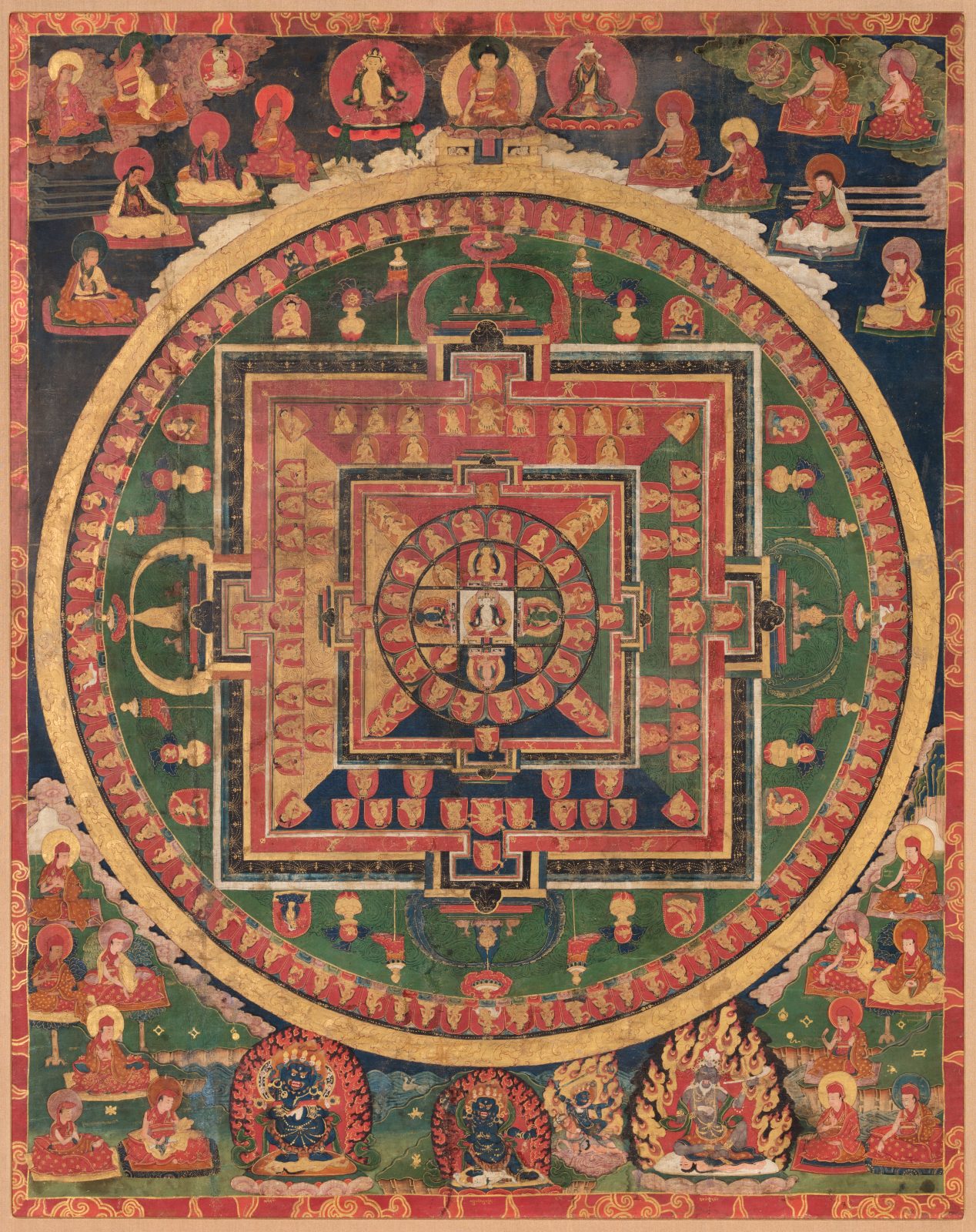
Sarvavid Vairochana Mandala; Tibet; 17th century; Pigments on cloth; Rubin Museum of Himalayan Art, Gift of Shelley and Donald Rubin; C2006.66.346
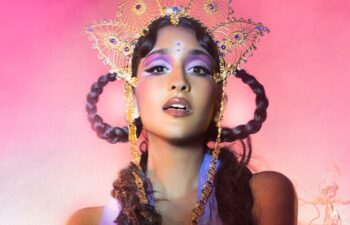
For Raveena, music is meant to be a “complete expression of the self.” It’s a truth she’s leaned on through a whirlwind couple of years, which saw a potent flurry of output and a pointed ascent into the conversation with her critically acclaimed 2019 debut full-length, Lucid, and 2020 follow-up, Moonstone EP. Asha’s Awakening takes listeners on an epic deep dive into Indian culture. An homage to her heritage as a first-generation descendant of genocide survivors and Reiki healers, the album incorporates influences from Bollywood and celebrated Indian artists like R.D. Burman and Asha Bhosle, as well as Western music—specifically R&B, rock, and soul—and melds the genres prevalent throughout Raveena’s catalog into one cohesive body of work. The album also marries eras in time, fusing together a contemporary take on sounds influenced by Alice Coltrane and Asha Puthli from the 60s and 70s with those of Timbaland, Missy Elliott, M.I.A., and Jai Paul from the early 2000s. It is a labor of love that represents her evolution as an artist. Raveena remarks, “I think it’s really fun putting people in uncomfortable positions to receive new sides of you. The human experience is so vast.”
Inspired by artists like Sade, Corinne Bailey Rae, Minnie Riperton, and Indian singer Asha Puthli, Raveena is a highly creative, dynamic, and spiritual artist who aims to build fully realized worlds within each of her projects: conceptual experimentations in sound, threaded together by stories of healing and self-realization meant to be experienced from start to finish.
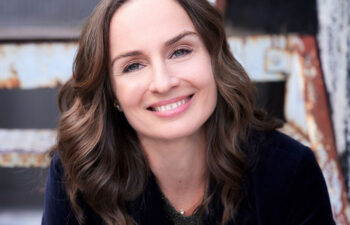
Tracy A. Dennis-Tiwary, PhD, is a professor of psychology and neuroscience at The City University of New York. As director of the Emotion Regulation Lab, she conducts NIH-funded research on anxiety, suicide, and digital therapeutics for stress and anxiety. She is the cofounder of Arcade Therapeutics, which translates cutting-edge science into digital tools for behavioral health, and co-executive director of the Center for Health Technology at Hunter College. She is the author of Future Tense: Making Anxiety Our Superpower.
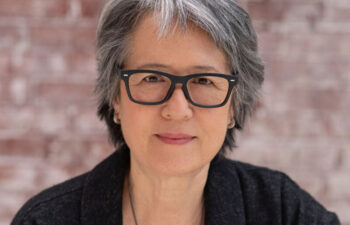
Ruth Ozeki is a novelist, filmmaker, and Zen Buddhist priest, whose books have garnered international acclaim for their ability to integrate issues of science, technology, religion, environmental politics, and global pop culture into unique, hybrid, narrative forms. Her new novel, The Book of Form and Emptiness, published by Viking in September 2021, tells the story of a young boy who, after the death of his father, starts to hear voices and finds solace in the companionship of his very own book. The Book of Form and Emptiness has been shortlisted for the UK Women’s Prize for Fiction. Her first two novels, My Year of Meats (1998) and All Over Creation(2003), have been translated into 11 languages and published in 14 countries. Her third novel, A Tale for the Time Being (2013), won the L.A. Times Book Prize, was shortlisted for the Man Booker Prize and the National Book Critics Circle Award, and has been published in over 30 countries. Her work of personal non-fiction, The Face: A Time Code (2016), was published by Restless Books as part of their groundbreaking series called The Face. Ruth’s documentary and dramatic independent films, including Halving the Bones, have been shown on PBS, at the Sundance Film Festival, and at colleges and universities across the country. A longtime Buddhist practitioner, Ruth was ordained in 2010 and is affiliated with the Brooklyn Zen Center and the Everyday Zen Foundation. She splits her time between Western Massachusetts, New York City, and British Columbia, Canada. She currently teaches creative writing at Smith College, where she is the Grace Jarcho Ross 1933 Professor of Humanities in the Department of English Language and Literature.
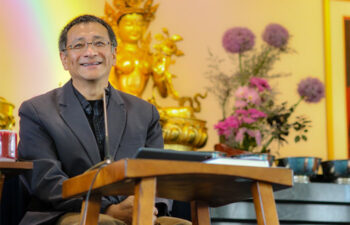
Dzogchen Ponlop Rinpoche is a widely celebrated Buddhist teacher and the author of Emotional Rescue, Rebel Buddha, and other books. A lover of music, art and urban culture, Rinpoche is a poet, photographer, accomplished calligrapher and visual artist, as well as a prolific author. Rinpoche is the founder, president, and spiritual director of Nalandabodhi, an international community of Buddhist centers. Rinpoche is acknowledged as one of the foremost scholars and meditation masters of his generation in the Nyingma and Kagyu schools of Tibetan Buddhism. He is known for his sharp intellect, humor, and easygoing teaching style, for launching the kindness initiative #GoKind and for his outreach to communities internationally.
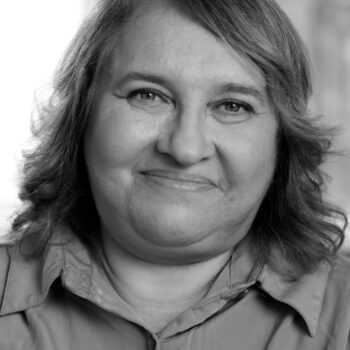
Sharon Salzberg, Cofounder of the Insight Meditation Society in Barre, Massachusetts, has guided meditation retreats worldwide since 1974. Her latest books are Real Life: The Journey from Isolation to Openness and Freedom and Finding Your Way: Meditations, Thoughts, and Wisdom for Living an Authentic Life. She is a weekly columnist for On Being, a regular contributor to the Huffington Post, and the author of several other books, including the New York Times bestseller Real Happiness: The Power of Meditation, Real Change: Mindfulness to Heal Ourselves and the World, Faith: Trusting Your Own Deepest Experience, and Lovingkindness: The Revolutionary Art of Happiness. Ms. Salzberg has been a regular participant in the Rubin’s many on-stage conversations and regards the Rubin as a supplemental office.
Get the latest news and stories from the Rubin, plus occasional information on how to support our work.